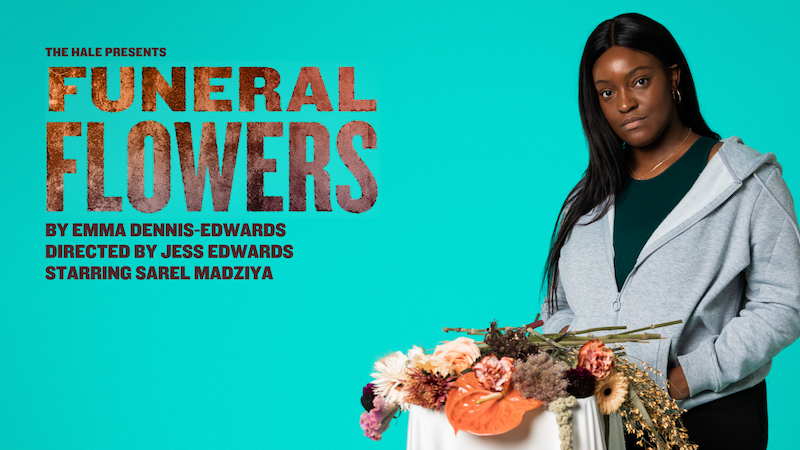
9th April
A well- deserved Edinburgh Fringe First
To hold an audience spellbound throughout a sixty-minute, one-woman show is no mean feat. Actor Sarel Madziya does just that in this deeply affecting story of a seventeen-year-old girl caught in the English care system. Written by Emma Dennis- Edwards, ‘Funeral Flowers’ won The Scotsman’s Fringe First award at the Edinburgh Festival in 2018, and the play makes a welcome reappearance in this national tour.
The narrative centres on Angelique, a sensitive, creative, young woman who struggles with school, gangs, college and foster placements while her mother does time in a women’s prison. While people let her down, Angelique finds solace in her passion for flowers, and the symbolism of flowers runs like a seam of poetry through the spare colloquial language of the text. Her favourites are lilies, the funeral flowers of the title. Far from symbolising death, she tells us, lilies stand for innocence. And her connection with flowers is so intense that, when it seems as if her innocence has been destroyed, she sees fragments of white lilies drifting from the tips of her fingers.
The play hints at Angelique’s chaotic childhood, while focusing on a pivotal moment in her coming of age. There is no moralising. In the best tradition of drama, Funeral Flowers tackles profound societal issues without preaching or overt explanation. We see and feel Angelique’s burst of aggression towards her foster carer as the product of her own self -loathing. And we see and feel how that self-loathing was itself the product of an earlier act of aggression, depicted in a scene of harrowing violence. At one point, she takes a stand, saying,
‘By locking up my mum, you’re punishing me as well.’
The stark declaration feels not only true, but wholly in character.
Madziya’s performance, directed by Jess Edwards, is deeply physical. Through a sudden shift of voice and body language, the actor becomes Mickey, the feckless boyfriend, pleading, wheedling, trying to get his girlfriend back after an act of brutal cowardice. She is equally convincing as Carol, the posh florist from Muswell Hill, resting her chin in her hand, gazing at her protegee with mingled affection and condescension as she doles out advice in her cut glass accent. A moment later she morphs into the foster carer Sam, sensible, and caring, the one figure of stability in Angelique’s life, her good intentions constantly thwarted by the girl’s desperate search for a different kind of love.
The narrative builds to a climax at a party. Angelique experiences violence and treachery which all but floors her. But like the poet Maya Angelou, whose own story is echoed in much of what happens here, she rises strong, learning that she can become what she yearns to be. Her ambitions are modest. A shop, a small flat, life with her mother in an Edmonton new build. And yet at times they feel far beyond her reach. At other times it is clear that her ambitions to run her own florist’s comes from a need not just for independence but to give and share in those experiences of birth and love and death which are central to human life.
An effective stark design by Jida Akil consists of four grey blocks ranged across the stage area. Atmospheric sound and lighting transform this simple set into an urban landscape, a classroom, low rise flats, a florist’s shop and the visiting area of her mother’s prison. Clad in jeans, fleece and puffa, Madziya presents Anglique as a physically and socially awkward teenager, while at the same time offering glimmers of the proud and beautiful woman she will become.
Funeral Flowers is inspired by real events. Gina Moffat was a prisoner at HMP Holloway who began her floristry business whilst incarcerated. In addition to the traditional venues of the tour, the play will be visiting several prisons, as well as running an outreach programme aimed at exploring creative responses to the show from inmates. Do see it if you can – for the story it tells and for a superb piece of acting.
★★★★★ Ros Carne 10th April
Photo credit: Corinne Cumming

